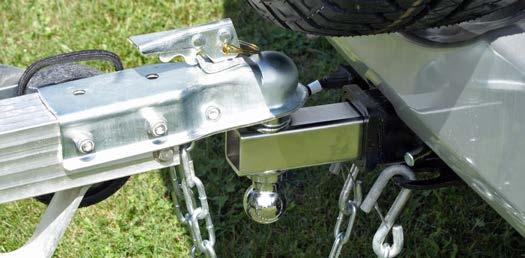
4 minute read
HOW TO: BEGINNING OF SEASON MAINTENANCE
Beginning of the Season Maintenance
For many people, the camping season had a delayed start. And for some, it’s just beginning. Just like your car or truck, your tiny camper was a major investment in either time, money, or both. You’ll want to properly take care of it so your home away from home remains safe and comfortable. We may need to take special care since many of us go off the beaten path (aka “road”) and the vibrations caused by poor roads can wreak havoc on our tiny campers.
So, just as you prepare your car for a vacation, it is equally important to keep your tiny camper maintained to avoid any costly repairs or any major problems while you are on the road. The key to maintaining your tiny camper is to create a regular maintenance schedule that can be followed throughout the year. One effective way to determine what kind of maintenance and repairs your tiny camper needs, in addition to general maintenance, is to take a short trip or “practice run” before your planned vacation. Make a list of frequently used equipment during your trip and make sure you have each part repaired or adjusted before your big trip. This helps to make sure that nothing is overlooked, and you can focus on enjoying your trip. But just in case, do carry a small tool set with you at all times so you can make emergency repairs, if necessary.
Before every trip:
• Check your campers lug nuts to make sure they haven’t loosened up. Tighten if necessary.
Driving with loose lug nuts is dangerous and could lead to losing a wheel on the road. Years ago, a friend had a front tire come off his car while he was driving about 50 mph because the lug nuts were not tightened when he put his snow tires on for the season. Don’t let that happen to your tiny camper! • Check your tiny camper’s tire pressure and adjust as needed. It is important to have the tire pressure right for your camper. Check your tire pressure by finding the correct pressure on the sidewall of the tire by using a hand-held pressure gauge. Otherwise, take your trailer to your local tire dealer and have them professionally checked. This will be highlighted in a future issue. • Confirm that all of your outside trailer lights are working correctly, i.e., brake lights, reverse lights, and turn signals. The connection from your tiny camper to your tow-vehicle is critical.
We all know that when we’re on the road, people may drive closer to get a good look at our unique tiny campers! So making sure this connection works correctly helps you to be seen by other drivers. In some cases, this connection may also help charge your tiny camper’s battery while you’re driving. • Clean, if needed and properly grease your major towing components. There are a few components to inspect, but the main ones are: trailer hitch and trailer coupler. Over time, towing your tiny camper can cause road/dirt grime to work it’s way into these components and cause issues. To avoid towing issues, it is essential all the hitching and towing parts are well-maintained. • If you are in a larger, tiny camper, such as a T@B or larger square drop check your holding tanks to make sure they are functioning properly. You may have three holding tanks: fresh water, gray water, and black water. • Wash your tiny camper, especially if you’ve recently towed it near the ocean because the salt can corrode the metal of your trailer. Usually, a mild detergent with a large sponge is sufficient for cleaning most tiny camper exteriors. I don’t recommend taking them through a car wash or using high-pressure hoses, because they can damage the finish and loosen fittings.
Make sure you rinse the undercarriage of the trailer, because this is where a lot of the dirt and grime can build up, but be gentle near any electrical wires if they are visible underneath.


Before the season starts:
• Check your tiny camper for leaks frequently. Water leaks can happen through any seam in your camper. Check the roof edges, around vents, windows and doors, etc. • Check your battery. You don’t want to find the most amazing boondocking site for miles around only to find out you have zero juice in the battery! Usually, after about three years, your deep cycle battery starts to lose capacity. • Clean your awnings, side tents, or other extra coverings. Keep your awnings clean so you don’t get mold and mildew buildup. By inspecting them on a regular basis, you may also catch any possible tears early on so you can fix them before they become larger issues.
Make sure your awning is completely dry before storing, otherwise it may become moldy and mildewed. Leaves, sticks and grime can also build up on awnings, so it is important to properly clean your awning before packing it away when possible. If you have to put these items away wet, be sure to air them out and clean them on the next dry day to avoid future problems.
Ready to Go!
Tiny campers are a great way to spend time with family and friends and to explore hidden gems near and far. Make the most of your investment by keeping your tiny camper well-maintained and ready to go at a moment's notice!







